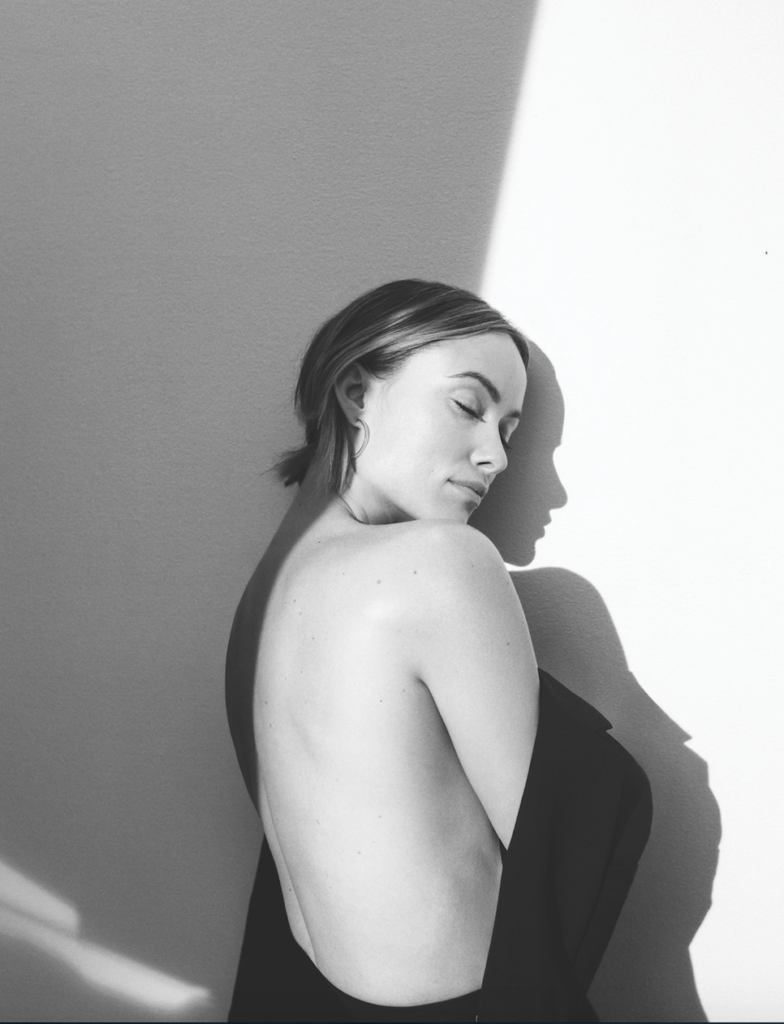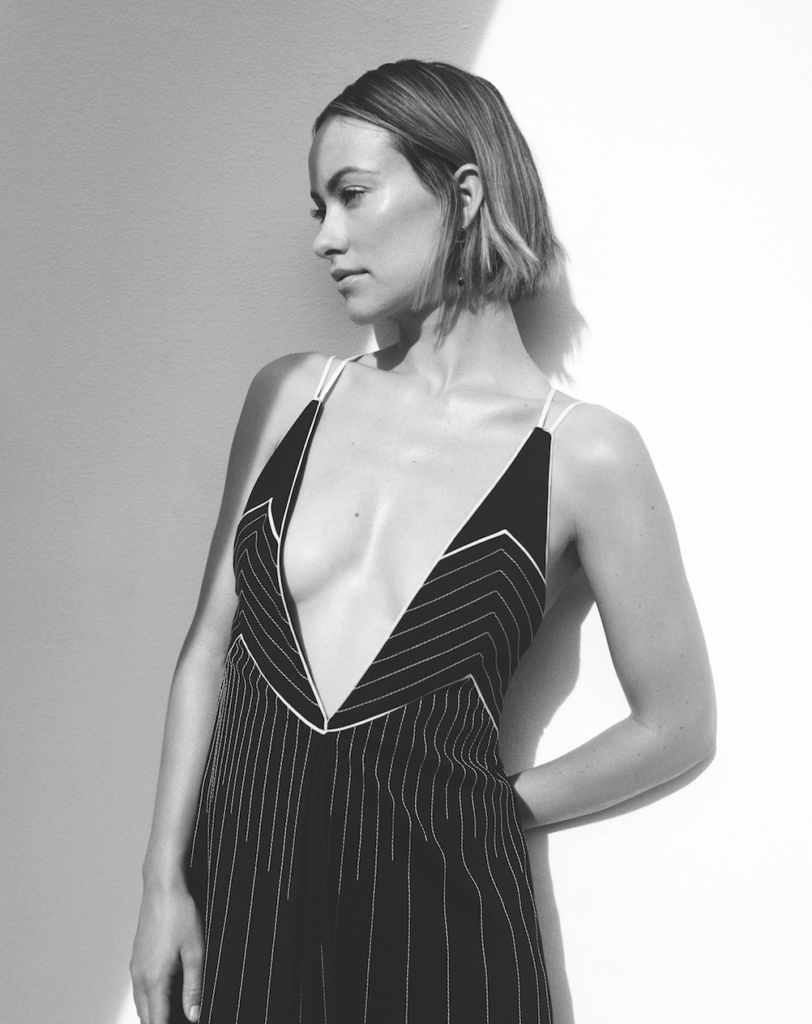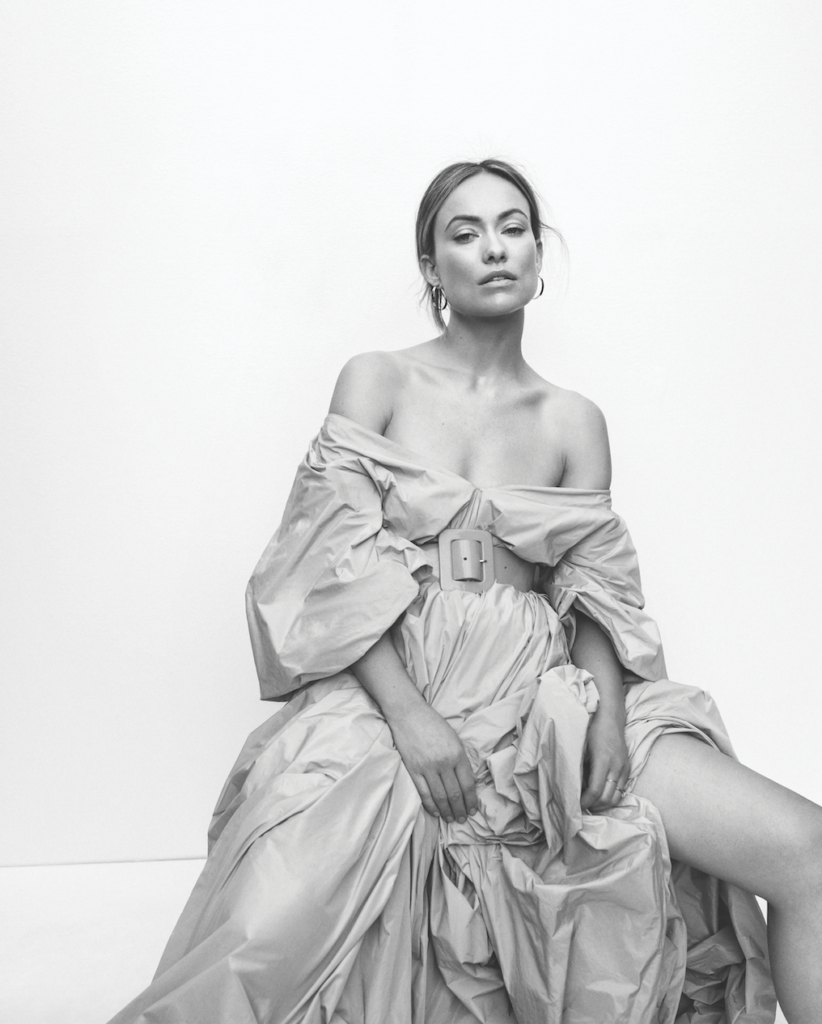
First-time feature film director Olivia Wilde takes women’s empowerment to a new level of hilarity with Booksmart, which debuts Memorial Day weekend. Wilde, herself a renaissance woman—actress, activist, mother-of-two, producer and now director—has made the most graceful and successful transition from on-screen to behind the camera in a long time. She caught the directing bug making music videos for the Red Hot Chili Peppers and Edward Sharpe and the Magnetic Zeros, and grabbed the opportunity to make people laugh. In Booksmart, the star of Her, Rush and Meadowland, which she also produced, challenges two up-and-coming actresses, Kaitlyn Dever and Beanie Feldstein, as well as her fiancé, Jason Sudeikis (whose improv scenes are brilliant), to create a raw, fresh take on a teen party film, and all three rise to the occasion.
Cristina Cuomo: Your film is wonderful. I laughed throughout the whole thing. Congratulations!
Olivia Wilde: Oh, good. That is awesome. Thank you.
CC: You really are a renaissance woman, involved in so many socially conscious organizations. I’m going to just jump right in with Booksmart. How was your experience directing your first film?
OW: It was honestly better than I ever imagined it would be. I think that’s because of the awesome team I was able to assemble. It’s really rare for a director to be able to cast and hire whoever they want in their first film. I lucked out because I was able to assemble a group that realized my vision in such a fantastic way. I could go on for hours about the magic of the collaboration on Booksmart.
CC: When was the moment you decided to direct?
OW: It’s hard to pinpoint a moment. I know that in my early days as an actress, I found myself gravitating behind the camera, and asking directors a lot of really annoying questions like, “How does this work?” “What’s that lens?” “Why do we do it there?” “How does this happen?” By the time I was 24, producers and directors started telling me, “You know you have to direct, right?” And I was like, “Well, I don’t know. I’m scared. I didn’t go to film school.”
At a certain point, I realized that I was ready to dip my toe in the water, so I directed a short film as a part of an awesome program that doesn’t exist anymore called Glamour: Reel Moments, where actresses were given the opportunity to direct a short film. That experience allowed me to understand how happy I felt on set as the director. From there, I began directing music videos. That was a dream, because it’s an opportunity to tell a nonlinear story without dialogue, to be impressionistic and allow yourself to just play with the tools of filmmaking, to just have fun with the medium.
When making a music video for the Red Hot Chili Peppers, a song called “Dark Necessities,” I cast four young girl skaters who were so brave and inspiring. The video was about their strength and courage, how they were proud of their scars, their bruises. It was during the editing process of “Dark Necessities” that I realized I really wanted to tell a story about young women. Around that time, my friend Jessica Elbaum, who runs Gloria Sanchez [Productions], said, “I’m producing this movie with Annapurna called Booksmart. We’re looking for a director. You should just read it.” The script was a couple of years old. I pitched Annapurna and said, “I want to direct this movie. I know what it can be. I’m so inspired by it.” I hired Katie Silberman to come on board and rewrite it completely.
CC: Did you find it tough to direct a comedy, especially one with young adults?
OW: Comedy is incredibly difficult. It’s a high-wire act. Comedies deserve more credit than they get. For some reason, they have a reputation for being easier than drama, but…
CC: I would imagine it would be harder.
OW: It is harder. I was lucky enough to have an awesome cast, who understood the tone of the movie that I wanted to make. They understood exactly that we were making something that was grounded, but at times heightened. At its core, it’s a relationship movie, it’s a love story, it’s really a romantic comedy, but we wanted to have a rhythm to it that felt as highly paced as the thoughts of these two brilliant women. Everyone totally understood that.

CC: How was it telling your fiancé what to do?
OW: [Laughs] The awesome thing about Jason [Sudeikis] is he’s an incredible improviser. He is truly one of the world’s best, so in those scenes, I was able to just give him a nugget of information, one line, and he would fly with the rest. That scene in the lift, we gave him one word. He just went nuts with it, and then when he saw the movie he was like, “Whoa, I didn’t know you were gonna use all of that.” And I was like, “I laughed so hard. I kept all of it.”
CC: Well, you’re both comedic talents, and people say, “Laughter is the best medicine.” In what ways do you make each other laugh? Is that part of how you relate to one another—a shared sense of humor?
OW: That was the first thing I loved about Jason, that we could joke around, and I didn’t have to explain myself. He understood my weird sense of humor, and I understood his, and we very quickly had a shorthand with each other. We both take in the world and process it in a similar way. It’s been great to do that as parents as well, because there’s nothing funnier than little kids.
CC: What’s the best advice you give to your kids?
OW: They’re 2 and 5, and I’m already explaining to them that they have to stay true to themselves and not worry about what others think and to be kind, but not be overly conscious about what other people are doing or thinking. It’s a conversation that happens a lot.
CC: As an actor, what role have you not played that you’d like to?
OW: I was raised by journalists. My mom really rose through the ranks of journalism, at places like ABC News and CBS, during a time when women weren’t really operating in high positions. She was directing documentaries for Frontline when I was a kid. She was a producer at 60 Minutes for over 30 years. She’s really fascinating to me. I have a lot of admiration for all the journalists of her generation that I grew up around. My grandparents were journalists, my uncles, my cousins, my aunts—really everybody in the family but me. I have never played a journalist, which seems nuts. I have this feeling that when I do play a journalist, it will be my best performance. I don’t know how or when or who will direct it, and maybe it will be me. I would love to do a female version of All the President’s Men.
CC: What do you love the most—filmmaking, acting or your activist work?
OW: I think I’m at my happiest while directing, working with actors. That’s when I feel the most energized, and capable of anything.
CC: Is it more pressure or less pressure than acting?
OW: Way, way more. If you’re in a bad movie as an actor, you just blame the director, as you should. You can just sort of throw your hands up and say, “Well, I tried.” As a director, you have to take responsibility for how the movie turns out, so the pressure is high, but the reward is also high because you can make something that you care about. You feel that you’ve contributed to the conversation, and that’s how I feel with Booksmart.

CC: I also want to talk about beauty and fitness. You always look like you’re in great shape, and with two kids. It’s impressive to me, because I have three and it’s a struggle. What do you do to stay fit, physically and mentally?
OW: When I’m in Los Angeles, I go to a SoulCycle class taught by an amazing coach and motivational speaker, Angela Manuel Davis. She is truly a guru, and I never feel as physically capable as when I leave her class. In New York, there’s an awesome dance studio called Forward Space [founded by Kristin Sudeikis], which feels liberating, because it’s not as high-pressure as a lot of dance studios, but it’s also an amazing workout. You just leave drenched in sweat, but happier. In my early 20s I went out dancing all the time, but I don’t find myself doing that really ever anymore, unfortunately.
CC: Especially when bedtime is at 7 o’clock with the kids.
OW: Exactly.
CC: Do you ever come out to the Hamptons?
OW: I do whenever I can. I have a really good friend who has a house in Southampton and many weekends in the summer, I am there so happily.
CC: Let’s talk about True Botanicals, for which you are the chief brand activist. There’s beauty and then there’s nontoxic beauty. Why was that important to you?
OW: I had gotten to the place where I couldn’t ignore the information that I’d learned about the lack of regulation in the skin-care industry in this country. The European Union has banned over 1,300 ingredients from skin care—and the US has banned about 11.
Once I realized that the FDA isn’t forcing companies to be as transparent as they should be, I decided that I wanted to partner with a skin-care company that was committed to finding a nontoxic, cruelty-free alternative that wasn’t sacrificing efficacy, because in the end, like a lot of people, I just want results. I wanted to take care of my skin so I could age in a way that felt gentle. I found actual results using True Botanicals.
I used to have cystic acne, and it would flare up always at the worst possible moment, of course. I just spent so many years of my career caked with makeup and trying to hide these breakouts. I went to dermatologists, who told me I needed all sorts of really intense treatments, injections, peels and acids. Then, when I was pregnant with my first kid, I learned, like every mother, to avoid exposure to certain chemicals. We have such higher standards for ourselves when we’re pregnant, as though when we’re not pregnant, we’re not worth the extra care. That really disturbed me: Why am I allowed to expose myself to these chemicals when I’m not pregnant if they’re this bad? Surely we should just avoid them.
So I started researching the hell out of the nontoxic skin-care space. I asked around and soon people told me about True Botanicals. They said, “It’s this company founded by women,” which I loved, “and they are really changing the game in nontoxic skin care because they’re one of the only made-safe, high-end skin-care companies.” I met with them. I used their Clear Collection, and all my skin problems went away. It didn’t seem possible, because at that point I didn’t understand how an oil was going to clear up my acne. Here was a completely different philosophy.
CC: Were there special ingredients that you found to be really nourishing?
OW: They use whole ingredients. Nothing is watered down or supplemented with waxes. Wax is used in a lot of moisturizers to mimic the feeling of having smooth skin, but actually those fillers are what end up clogging pores. The transparency of the True Botanicals ingredients list is pretty rare. None of it is filler. It’s all essential.
CC: Did all this research change the way you eat?
OW: Yes. It made me read ingredient lists more carefully, and be more conscious of what I eat, because if I’m being this conscious of what I’m putting on my skin, I have to think about what I’m putting into my body.
CC: What’s the best advice anyone has ever given you?
OW: Don’t pluck your eyebrows and drink more water. Follow your dreams and direct your movie. Tell your story!



